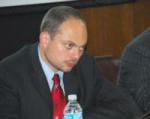Vladimir Kara Murza
http://www.worldaffairsjournal...29 August 2014
MOSCOW — One of the key themes of Vladimir Putin’s propaganda machine—both for domestic and for foreign consumption—has always been the supposed lack of a better alternative. However unattractive Putin’s corrupt and authoritarian regime, the implicit reasoning went, its replacement would be worse—radical nationalists or leftists. It was no accident that, during the mass anti-Putin protests in 2011–2012, state television channels went out of their way to pick out communist and nationalist flags in the crowd—even though communists and nationalists accounted for, respectively, 13 percent and 6 percent of the demonstrators, while the vast majority expressed pro-democracy views.
This “argument”—from a regime that routinely labels Russia’s democratic opposition “Russophobic”—assumes that, given a choice in a free election, the Russian people would inevitably vote against democracy; that Russians are somehow uniquely “unsuited” for a democratic system that has proven perfectly workable in other post-communist (including Slavic) states.
Coming from pro-Kremlin mouthpieces, this “argument” is not worth a mention, let alone a response. Not so when it is echoed in an article by a respected author, such as the New Republic’s Julia Ioffe. “Putin is not popular only because he controls the television,” Ioffe argues. “He is also popular because he is giving Russia something that is quintessentially Russian. Putin is just a variation on the Soviet Union, which was just a variation on the monarchy.” “The liberal opposition that rose up from the Internet ghetto in December 2011 was only 100,000 strong in a city of twelve million,” she continues. “It’s hard not to fear that [Putin’s] replacement will make us long for the days of his thuggishly predictable unpredictability.”
While rhetorically effective, the notion of a “100,000-strong opposition in a twelve-million city” is clearly misleading: by this measure, the Maidan protests that toppled Viktor Yanukovych and that attracted demonstrators from across Ukraine could be labeled as “500,000-strong opposition in a country of 46 million.” The hundreds of thousands of people prepared to brave the police batons (and, in Ukraine, police bullets) on the streets have millions of supporters behind them. In Russia’s case, public support for the anti-Putin protest movement at its peak in the winter of 2012 stood at 43 percent, against 42 percent who were opposed—a remarkable parity given the relentless pro-Kremlin television propaganda. Just a year ago, 27 percent of Muscovites, according to official numbers, voted for anticorruption campaigner Alexei Navalny in the mayoral election, the highest level of opposition support in years. In most cases, Putin’s opponents are simply barred from the ballot—both on the national and on the regional level—with pro-regime candidates left to “compete” with approved shadow boxers. Hardly the behavior one would expect from a genuinely popular government.
In fact, antidemocratic forces have always fared badly in Russian elections, whenever they were free and competitive. In the country’s first-ever nationwide poll, in 1906, the Constitutional Democratic Party, which campaigned for reform and a British-style parliamentary system, won a plurality of seats in the State Duma, while far-right monarchists failed to get a single candidate elected. (In 1907, the czarist government had to restrict the franchise in order to end liberal dominance in Parliament.) In the 1917 election for the Constituent Assembly—held after the Bolsheviks seized power in a coup d’état—the usurpers lost to the pro-democracy Socialist Revolutionary Party, 24 percent to 40 percent, and proceeded to disperse the Assembly by force. The next time Russians had a chance to vote in a free election, in 1991, Boris Yeltsin, backed by the opposition Democratic Russia movement, defeated the Communist candidate, former Soviet Premier Nikolai Ryzhkov, by a humiliating 57 percent to 17 percent. Even the 1993 parliamentary election, usually remembered for the first-place finish of the ultranationalist Vladimir Zhirinovsky, showed significant support for centrist and liberal parties, which received a combined 40 percent of the vote against 35 percent for Zhirinovsky and the Communists. In 1996, in a tense showdown between President Yeltsin and Communist leader Gennady Zyuganov, Russian voters chose an unpopular incumbent over the prospect of a neo-Soviet restoration.
It is difficult to argue that the Soviet regime—which killed more Russians than it did members of any other national group, and which was rejected by Russian voters every time they had an opportunity to do so—was “quintessentially Russian.”
The idea that the Russian people are “unsuited” for democracy is no more acceptable than the Kremlin’s claim to “privileged interests” in neighboring countries. Neither of these extremes has a place in the 21st century. It is only a matter of time before Vladimir Putin becomes a political memory—and before Russia becomes a normal European democracy, like other countries that were once thought to be “unsuited.”
More about:
Europe and Central Asia,
Russia
Vladimir Kara-Murza's blog
http://www.worldaffairsjournal...
